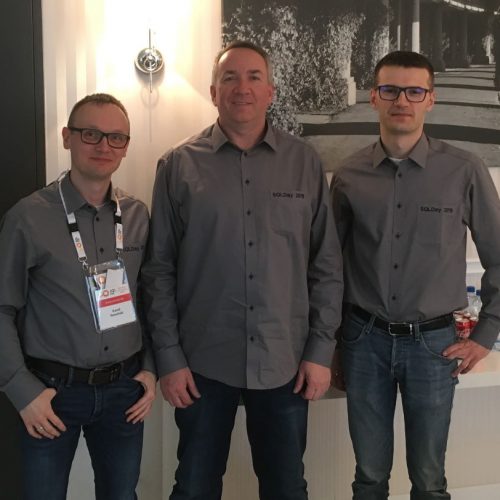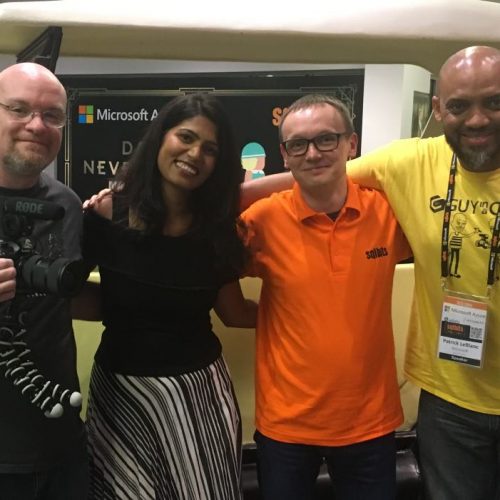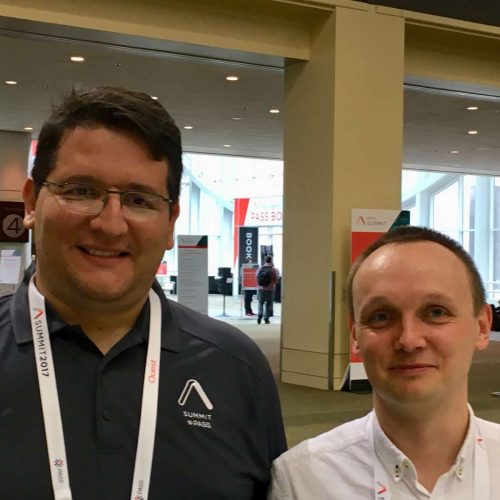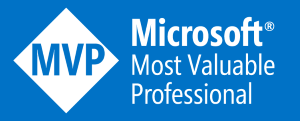ASF 012: Rob Sewell interview
Introduction
This talk has taken place during SQL Bits conference in London, on 22nd February 2018 (Thursday).
Interviewers: Kamil Nowiński & Hubert Kobierzewski [T]
What is his recipe for having a good speech? Where is a passion in his life? Check out which kind of toys Rob doesn’t take to abroad and why. Check that and also, why we had a lot of background noises during this chat (apologise for that).
Transcript
Kamil Nowinski: Hello, our today’s guest has the most recognisable and the longest beard among SQL family members, he is a PowerShell SQL automation guy, holder of MVP, blogger, speaker, PowerShell virtual group leader, DBA tools evangelist and one of the contributors of the tool, and probably it’s only a tip of the iceberg [laughter], probably I forgot about a lot of things…
Rob Sewell: There’s plenty of things, there are plenty of things.
KN: So, ladies and gentlemen, our guest is…
RS: Rob Sewell. Nice to meet you, hello.
Hubert Kobierzewski: Hello, Rob.
KN: Nice to meet you.
RS: And… so that everybody knows that the background noise is because we’re sat in SQLBits conference.
KN: Yes, absolutely.
 HK: 10 years!
HK: 10 years!
RS: 10 years, SQLBits, 10 years.
KN: Yeah, exactly, very round number… No, sorry, the round number is 16 [laughter].
[everybody laughs]
HK: So it was two years ago, that was the round number.
KN: Rob – thank you for accepting my invitation to this podcast. And the first question is – where do you live?
RS: I live in the South West of the UK. In the middle of nowhere, in a tiny little hamlet, I live next door to my dad on one side and my step-gran on the other side, it’s a beautiful place.
KN: I saw some pictures…
RS: Away from the world.
KN: Yeah… Are you happy with travelling a lot? From there, you know?
RS: What do you think? [laughter]
KN: Yeah, probably I know the answer.
RS: Considering the amount of… I love travelling. So one of beauties of where I live is that I’m quite close to the M5, so I can very quickly get anywhere around if I need to… Not quickly but I can get anywhere. And yeah, I’m lucky enough that my job and my passion means that last year I visited 17 countries.
KN: Wow. That’s a big number.
RS: Some for work, some for presentations… So yeah, I literally flew all the way around the world the wrong way.
KN: Singapore…
RS: Yeah. I flew to Singapore for PowerShell Conference Asia and then went from there via Japan to Seattle for PASS Summit and then flew back to London all in the space of two weeks. So that’s interesting. I wouldn’t recommend that.
KN: No?
RS: The jet lag is quite hard. The journey from Singapore to Seattle – you leave at 6 o’clock in the morning, you travel for 18 hours or something, and you arrive at 10 o’clock in the morning.
KN: Yeah. I felt exactly similar when I was going to Seattle, last year. From London, so I spent 9 hours on the flight and it still was only… I lost 3 hours, something like this.
RS: Yes, yes. It really makes your body go “what’s going on?”.
HK: OK, so – what do you do for the living? It’s, like, in general terms?
RS: In general terms… Very good question. I help organisations to do things that are automated, to make things go quicker and easier. So that’s real general. Would you like more specifics?
HK: Not necessarily. But at some stage you have received an MVP title.
RS: I have, yes.
HK: So what did that mean to you, when you got it?
RS: I found out that I got the MVP award whilst I was playing league cricket. So when you play cricket, you, one side, my side at that moment were batting, so we were not actually in the field playing the game, so I was waiting, picked up my phone, and just saw an e-mail alert come in… Oh, wow! And it literally took my breath away, I was so delighted, I was so pleased.
HK: Did you win that game?
RS: We did win the game, yes, we did win the game. Yes.
KN: On your website, I saw that sometimes Rob was also recognised a Microsoft Cloud and Data Centre MVP this year.
RS: This year, yes.
KN: It was last year, I think?
RS: Ah… Yeah. When I wrote it, it was this year.
KN: Yeah. [laughter]
HK: There are lot of people who are, like, looking at what you publish, what you present, what hints would you give to those, who are DBA wannabes, they start on the job market or they are kind of finishing their studies… Are there any, like, three major hints that you would give them for their future career? What they should focus on?
RS: Understand that you will never stop learning. Just because you are finishing your studies or you are doing your exams, that’s never ever gonna be the end of it. Even when your beard in grey like mine, you are gonna be needing to research and find out and learn about new things and new concepts. That’s number one cause that’s really important to know that if you’re gonna choose that career, this is the thing it’s gonna be.
HK: Every day is a school day, yeah?
RS: Every day is a school day. Never ever stop learning things. One of my mantras: never stop learning. And secondly, I would say, don’t aim on being a DBA. Aim on doing something that you love to do, you really enjoy doing, and that you do with a passion. Cause that way you’re gonna do something that’s much more fun. And it’s OK if you do… I was speaking with somebody in our session today. She started as an application developer and then moved into doing some sort of BI things, and then actually found she enjoyed hearing about the DBAs and chose to find a job where that was gonna be part of her new job, and now she’s moving towards being a DBA. So it wasn’t really that she chose one thing. She chose to be an application developer, but gradually she moves forward, she’s gonna be for something else. And it’s kinda the same for myself, because I didn’t choose to be a production DBA. This is my third career. I’ve done other things in the past. And I just… I was the guy who was good at computers so I enjoyed being around computers, and I moved forward, and I’ve got an opportunity to be a DBA, and I’ve found that I really loved it. And that’s how I started. And I was a production DBA for a long time. And now, I’ve moved really… my work is not necessarily production DBA anymore. So it’s moved forward. So I don’t think you’re ever gonna sit still and be one particular thing. If you like that, it’s cool, and if you don’t like that, then that’s OK. Find a different thing that catches you. So that’s two things.
Third thing, I think if you’re gonna be a production DBA, is to… Don’t expect to be a top dog straight away. Understand what you’re gonna do. SQL Server’s really, really wide. So broad, so much stuff you can know… So make sure that you can at least understand the concept of a lot of it, and then find the thing that catches your passion and your thing and then go deep into that. So… I don’t really… I understand the SSAS and cubes and that sort of thing, I can have a conversation, I can help that, but I really don’t know it very deep. Whereas some other parts of SQL Server, I do know much deeper. And I think as long as you accept that you know where the gaps are. Bonus tip.
KN: If you want to be good at something, you should be focused only at one specific something, yeah.
RS: So that was three. I will give you a bonus tip. Bonus tip is, people will give you a lot more respect when you say “I don’t know”. So if you don’t know the answer to something, say “I don’t know”.
KN: Yeah, many people are just afraid of giving that answer, yeah?
RS: Absolutely. They either feel that “Oh, I should know that”, you know, I think that inside sometimes “I should know that but I don’t”. And… But also sometimes they go the other way and they try and bluff, and sort of waffle and talk and people don’t respect you if you do that…
KN: Yeah, absolutely.
RS: So if you don’t know, say “I don’t know”.
KN: So, you are giving a lot of speeches across the world, yes?
RS: Yes.
KN: And… So, how do you prepare yourself for a speech?
RS: So it goes back a long way, back to beginning… So generally, what happens with me, is I will find a “thing”, whatever that “thing” particularly is at that moment in time. And I’ll normally write some blog posts about it as I go through solving a problem or working out what’s going on. And then there’s blog posts coming and I think: “you know what, actually this could make a nice presentation”. So then I start giving some presentation, thoughts in my head and I start making sure I got some demos about what’s going on. And then I might build some slides, and get an abstract together, and send the abstract off to people. And then if I’m lucky enough to get selected, then I will go back to my demos, I go through it, make sure that everything works as I expected, I’d write pester test to make sure my presentation is gonna work as I expected to do, because I blog about it, I do it, because it works for me really, really well. And then I’ll build my slide deck, and then I will practice. And practice, and I will practice, and then I will practice. And I will practice speaking out loud. My dog, my wife, my cat, the horse – they all heard these presentations as I’ve gone through them. And I will sit through…
KN: They must. [laughter]
RS: I just go through, and go through, and go through, and go through… And you are practicing to get used to the sound of your own voice, to make sure that you can comfortably say what’s going on. You practice without having the slides so that you can just keep on talking. And you practice also so you get a good understanding of how the talk’s gonna go, what the timings need to be. And no matter how much you practice the timings, the timing is never going to be right. And once you have done some presentations and you’ve spent some time doing it, you will be able to learn how you can vary that timing, manage it, speed up or slow down or whatever. But you only gonna do that if you can practice, and it’s really, really comfortable.
KN: So you’re working a lot, I think, yeah?
RS: Yeah.
KN: You are engaged in many areas.
RS: Yes.
KN: So how about your work-life balance? You have something like this? Can you manage that?
RS: So… Do you know what my wife says?
HK: There is no such thing like work-life balance?
RS: What my wife says, she says “you are really lucky”. I say “What do you mean?”. “So your work is your hobby, is your job, is your passion, is your fun, is your social time, is your career, and those things can sort of merge into one another”. There was a day a few weeks ago, when I worked at home. And I worked at home, and I started at 6:30 in the morning, and I finished at 10:30 at night. And she said, “what have you been doing?”. Not in a bad way, just like “what was it that you’ve been doing all that time?”. And we were sort of talking about it. And I realised that some of it was work for clients and some work was writing a blog, and some of it was doing organisation stuff for the PowerShell Conference in Europe. And some of it was practicing presentations, and some of it was answering e-mails for other clients. And it all sort of happened in one big block, and you couldn’t really see which bits were work, which bits were clients, and which bits were community, which bits were presentations. It all kind of blurred into one. And I’m lucky because I have a very understanding wife, and also because the kids are growing up, so it’s just the two of us and the dog, and the cat and two horses. So, you know, I’m lucky.
HK: Probably… For sure we’ve just mentioned that, but how important is passion for you?
RS: Passion is what you get with me. The things you hear me talk about, and that I blog about, are things I am passionate about, because I love what I do, I’m so lucky. Outside of IT stuff, I’m passionate about cricket. I play cricket for a league side, I like to watch cricket and I like to fly my drone.
KN: Aaaah! That’s… You won’t believe that, but this is exactly my next question [laughter]. So, my next question is: “Do you like taking photos?” And the extension of this question is: “How often do you use a drone for this?”
RS: So… Do I like taking photos – I love taking photos. I absolutely adore taking photos. One of the reasons I take photos is because my wife is not able to travel so much, and she likes to experience all of these places I go through all the photos I take as I go along. So I love being able to share all those with her, it’s really good fun. And yeah, I’ve got a drone. I’ve had drones for about 5 years now. I absolutely love it. It’s a real escape for me, because when I’m using a drone, I’m not sat at a desk with a computer in front of me, I’m out and about walking and doing stuff. I gotta go somewhere particular, I gotta check if it is a place where I’m allowed to fly the drone. I’ve gotta go and find something interesting to take a video of. And I go off and I take videos, and I take photos.
KN: I saw your photos from the drone. Yes, so it was amazing quality of the photos.
RS: Really, really good, really excellent.
KN: Yeah. I was so surprised.
HK: Do you take your drone with you when you travel?
RS: I haven’t taken my drone abroad. I need to think about… If it’s going in an aircraft, then I need to think about all the batteries and where they would be. I always worry, I take an awful lot of electrical equipment, as you imagine, so customs are always fun anyway. But so far I’ve only ever done it in the UK. I’d love to take it abroad but haven’t managed it quite yet. Cause there’s an awful lot of rules and regulations, so within the UK you are only allowed to fly up to 400 feet, you have to be within eyesight. There are certain places where you are not allowed to fly and… I’m not sure which authority name is precisely, but they provided an app with… That gives you the map that shows you where you can and can’t fly. So I’m very, very careful to follow all of those things and I haven’t really researched any other country yet. But undoubtedly, at some point I will take it abroad, yes.
KN: What kind of role do you play at the SQLBits Conference? Apart of, you know, being a speaker. Because you have finished two full days preconfs and another two regular sessions are ahead of you, so… But also, you are very deeply engaged in organisation of SQLBits.
RS: So in the organisation of SQLBits I have absolutely zero input at all. Nothing. I do nothing, I’m not a member of the committee, no part of the organisation at all.
KN: Really? Oh.
RS: Really, yeah.
So, this year, I did play a small part in some of the speaker selections, and up until then, my role has been as a helper, as a volunteer. So because I’m in the South West where Jonathan and Annette are, they are both members of the (SQLBits) committee, we run the user group together, did SQL Saturday Exeter together.
KN: Ah, so it’s easier, working together.
RS: Yeah, we know each other and we get on really, really well together. So I love helping people and I’m not afraid to talk to people. And…
KN: Yeah, we know that. [laughter]
RS: So… I really enjoy doing that part of it. So I’ve been the conference helper, the runner, room monitor, helping to make sure that it happens, in fact that’s what I’m doing for the next two days. I’ve got two sessions as well, but I’m gonna be a conference helper, running around, making sure that everything is happening smoothly, because you cannot imagine the amount of work that goes on to put on a conference the size of SQLBits. It’s done by volunteers in their own time and that’s before it happens. And then when the thing is actually going on, you need to make sure that the rooms are in the right place and the speakers arrive in right place, and they are starting and finishing at the right times and the audio is in the right place and that coffee is coming. And all of these things. And you’ve got 2000 people here, and they need to know where things are, and they have problems and issues they need to get resolved in certain ways, things break. And all of that is gotta come through and be organised in some way. So I play a tiny part in that.
KN: Yeah… Actually, we can imagine that, because we are organising SQLDay in Wrocław. Of course it’s not that size of the conference, yeah, but still.
RS: Not only that, both of you got orange shirts on, you’re both volunteers here as well, doing your part and helping.
KN: Yeah, both sides of the story.
KN: So you are blogging and tweeting a lot. Your last post is about 108 configurations.
RS: Yes.
KN: Today’s blog, today’s post. Tell me something about Pester and how it can help for DBAs?
RS: So I blog and tweet a lot… Yes, because I like to share what it is that I do. My point of view on that is that there is no point you guys going off on writing something if somebody else has already done it. Just like, I don’t go out and write something new when somebody else has already written it and I’m making use of it. And this is how we all learn and share and improve, and take ourselves forward. So Pester. I love Pester. Pester is one of my favourite things. I’m a big PowerShell person, I’ve always loved using PowerShell. And Pester enables us to… is a unit testing framework for PowerShell. It’s got two sides to it. You can use it in test-driven development (TDD) to write your PowerShell code in a good way, make sure that you are unit testing it correctly, it’s doing what you expected it to do, as you are writing it. Good, proper code writing. You can also use it withing the integration test, which is what we do in DBA tools. So DBA tools before a command goes out and is released to the public, it has already run an integration test against actuall SQL Servers, and we’ve made sure that all of the things that it’s supposed to do or what it needs to do, by using Pester to validate that’s what’s happened. And today, we announced DBA checks. And DBA checks enables anybody to run over… The are 80 tests, so there’s 109 configurations for those tests that enable SQL Server DBA to be able to validate that their environment is as they would expect it. Pester gives a nice good output. Green is “pass”, red is “fail”, so I like to say, green is good, red is bad. And we can also export it out into a JSON or any xml for use in CI processes, convert it to html. But best of all, you can prepare BI in front of it and make pretty dashboards.
KN: Yeah, that’s great. So in terms of Pester, so, does it mean that it’s not only for DBAs? If you use PowerShell, you can use Pester as a tester tool.
RS: Absolutely. So if you write your PowerShell code, you should use Pester to validate it with the unit test integration test and if you can write, if you can run a PowerShell command and get an output, you can write a Pester test to check if it’s the output that you want or not. And run it repeatedly and reliably, automated overnight and get results.
KN: Aha, great, because so far I thought that it’s mainly for DBAs, but it’s for developers as well.
RS: Anybody. Azure guys, admin guys, sysadmins, Active Directory, Exchange… There is no limit to where Pester is gonna stop. If you can connect to something with the PowerShell, you can use Pester to test it.
HK: We said the word “PowerShell” a lot during this interview. So the question is, what was that inflection point in your career that turned you to PowerShell? Was it any session or you’ve seen the speaker, or…?
RS: So, it was literally that validating my agent jobs had successfully completed before I even knew Pester, before Pester was even around. That was the thing enabling me to go on 100, 120 instances, and make sure that every single job works… And what I used PowerShell to do is to create and Excel sheet and turn a cell green for good and red for bad. So that’s where it really started and I went “this is the thing that works”. And many years later, I’m still doing the same but I’m doing it with Pester. So it’s really quite freaky, it’s quite funny.
HK: Yeah, good point, valid point. OK. What source code control environment do you recommend for continuous delivery of data bases?
RS: GitHub, or Git. Git is the sort of control you should use.
KN: Why do you prefer Git?
HK: Any reasons?
RS: What is your other option?
HK: Team Services.
KN: TFS?
RS: TFS, VSTS, they all work, I just like using Git.
HK: OK. So, what do you think about the role of advanced analytics in the role of DBA?
RS: What do you mean by advanced analytics?
HK: Like analysing logs, predicting situations, predicting problems…
RS: I’d say it’s the way the world is going. This is what we are going to do. There is no point trying to use human beings to analyse hundreds and thousands of files and text or whatever, because computers can do that so much better. That’s where we’re gonna be, we need to accept that. We were talking earlier about never stopping learning, always keeping moving forward. This is the way that we’re gonna start moving forward, so we have to accept that.
KN: Do the DBAs should worry about it? And try to find a new job?
RS: No. DBAs shouldn’t worry about finding a new job, DBAs should just adapt to survive, to do what they need to do.
KN: At the end of our conversation, tell us, where we can find you on the Internet, you know?
RS: Finding me on the Internet is really easy. Search Google for “SQL DBA with a beard”. [laughing]
If you wanna find me on Twitter, you’re gonna have to do “SQL DBA with beard”. So there’s no “a” there.
KN: We’ll add a link to that. And to your blog as well.
RS: Thank you very much.
KN: Thank you very much, Rob.
HK: Thank you very much.
RS: Thank you.
Useful links:
Rob’s twitter: @sqldbawithbeard
Rob’s blog: sqldbawithabeard.com
 PowerShell community: DBAtools.io
PowerShell community: DBAtools.io
PowerShell Virtual Group: PASS Website
Conferences: SQLBits, PSDayUK
About author
You might also like
ASF 026: Aaron Bertrand interview
Introduction Aaron Bertrand is a Product Manager at SentryOne, with industry experience dating back to Classic ASP and SQL Server 6.5. In his spare time, he is either playing volleyball,
ASF 022: Guy in a Cube interview (part 2)
This is the second part of the conversation. If you are not familiar with the first part – you can start from this post. Introduction Guy in a Cube is
ASF 009: Pedro Lopes interview
Introduction Pedro Lopes is a Senior Program Manager in the Database Systems Group, based in Redmond, WA, USA. He over 15 years of industry experience. He is currently responsible for Program








1 Comment
Cloud Formations - A New MVP Led Training Initiative | SQL Player
May 22, 20:49[…] Check out also my conversation with Paul, Rob or Chris, recorded already a few years ago. Do choose the audio or transcript version – […]